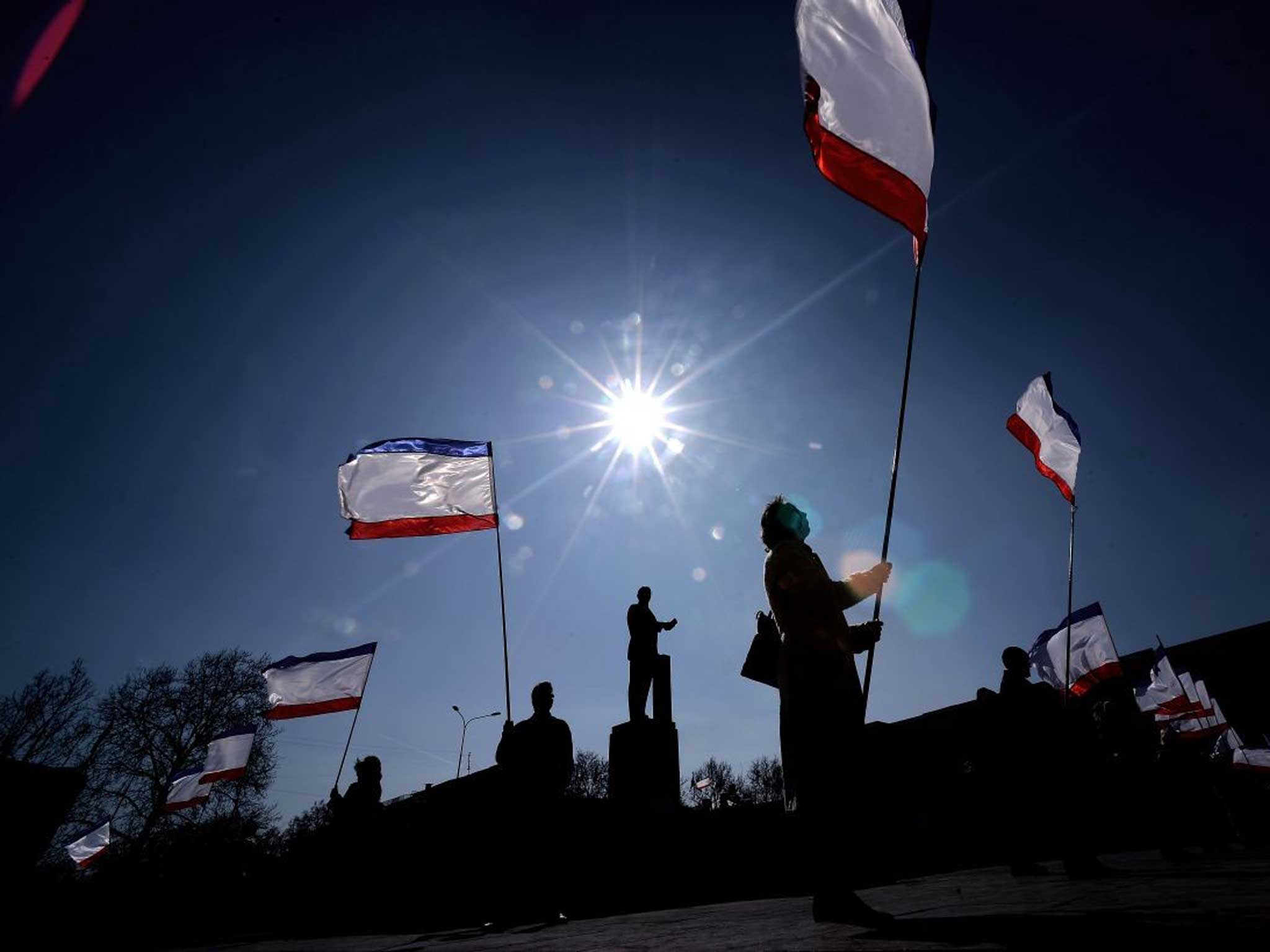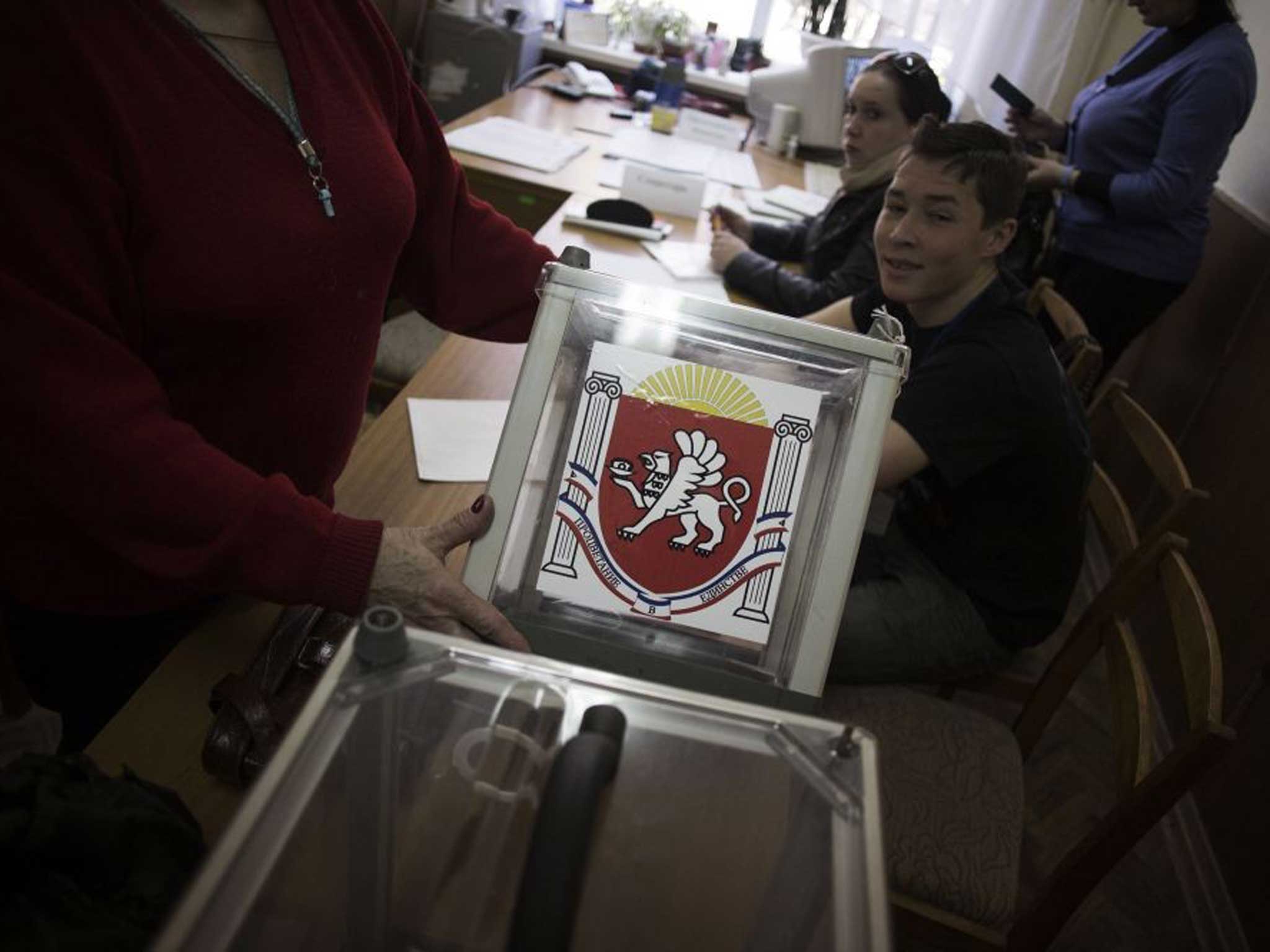Ukraine crisis: The last days of a united nation
The referendum will go ahead in spite of Russia's isolation

Your support helps us to tell the story
From reproductive rights to climate change to Big Tech, The Independent is on the ground when the story is developing. Whether it's investigating the financials of Elon Musk's pro-Trump PAC or producing our latest documentary, 'The A Word', which shines a light on the American women fighting for reproductive rights, we know how important it is to parse out the facts from the messaging.
At such a critical moment in US history, we need reporters on the ground. Your donation allows us to keep sending journalists to speak to both sides of the story.
The Independent is trusted by Americans across the entire political spectrum. And unlike many other quality news outlets, we choose not to lock Americans out of our reporting and analysis with paywalls. We believe quality journalism should be available to everyone, paid for by those who can afford it.
Your support makes all the difference.Bands played Russian patriotic songs in Lenin Square and a supposedly disbanded riot police unit, the feared Berkuts, manned checkpoints in balaclavas. This was the capital of Crimea on the eve of a referendum that will further inflame one of the biggest political crises in recent times.
While there was outward calm in Simferopol, military moves and strife further afield threatened the continuing dismemberment of Ukraine. The government in Kiev reported last night that Russian forces had moved across the border to occupy a strategic location in the Kherson region.
The foreign ministry in Kiev maintained that Ukrainian forces had scrambled aircraft and paratroopers to confront the “invaders”. Border guards in the area, however, insisted later that tensions had eased, with the Russians pledging that they had no offensive intentions and had made the move only to protect petrol depots against any “terrorist attacks”. The Foreign Office last night said they would be “very concerned if these reports proved to be accurate”, adding that Russia would be “held accountable” for the incursion.
At the United Nations, 13 out of 15 nations on the Security Council backed the resolution calling for all nations to respect Ukraine’s territorial integrity and condemn the referendum. Russia used its power as one of the five permanent members of the council alongside the UK, the US, France and China to veto the move, with China abstaining.
China’s abstention appeared to highlight the remote position of Russia, given that the nation is usually seen as an ally of Russia on the Security Council. While Russia’s veto was to be expected, China’s abstention could be the result Western nations were looking for.
Britain’s ambassador and permanent representative to the UN, Mark Lyall Grant, made clear that the outcome of the vote showed the “isolation” of Russia.

“The resounding message from today’s vote is that Russia stands isolated in this council and the international community,” he said.
Violence continued, with more deaths in Kharkiv and Donetsk, between pro- and anti-Russian protesters. The Crimean PM, Sergei Aksyonov, seemed eager to fan the flames, saying that he was prepared to support autonomy movements in the east of the country against the Ukrainian government.
In Moscow yesterday, tens of thousands rallied against President Vladimir Putin, believed to be the biggest such protest in two years. As many as 50,000 attended the rally. Nearby, some 15,000 supporters of Mr Putin came out to back the Crimean referendum.
The mood to help create a Greater Russia was also prevalent among some in the separatist concert in Lenin Square. “We have heard that fascists from the Maidan [the centre of protests in Kiev] are now attacking people in other parts. They killed two people in Kharkiv just because they spoke up for Russia. These killings cannot be allowed to continue,” Nikolai Kuznetsov, wearing the armband of the Self Defence Forces, shook his head. “Sure, there will be people here who would want to go and help. But for now, the first aim is to make sure Crimea can rejoin Russia.”
That process is near to completion. There is little doubt about the result of the voting. A typical joke runs: “The polls will close at 10pm on Sunday; the result will be announced at 10.30pm on Saturday.” In reality, there is not even much point in rigging the outcome, with most of those opposed to secession refusing to take part in what they consider to be an illegitimate process.
It would be difficult to forecast the voting exactly, as the last census was taken 13 years ago. According to that, ethnic Russians make up 57 per cent of the population, Ukrainians 23 per cent and Crimean Tatars 13 per cent. However, a significant minority of Russians don’t want to be controlled by Moscow and they, along with the other two groups, would have meant the count was not a foregone conclusion with greater participation.
Mustafa Dzhemilev, leader of the Tatar community, reaffirmed today that his group would boycott the vote. He has recently returned from Moscow where Mr Putin had failed to persuade him of the plebiscite.
Mr Dzhemilev expressed apprehension that the stance would make them targets. “We believe we are the ones who will suffer most,” he said. The Tatars were deported en masse by Stalin at the end of the Second World War and returned only in the 1990s. Tatar homes in some areas have had crosses scratched on doors – the ominous ritual that preceded the round-up in 1945. Ava Mamartova collapsed after seeing a group of hooded men mark her door in the town on Bakhchisarai, working from what looked like an official list.
The central rail station in Simferopol was packed yesterday afternoon, with those grabbing what they saw as the last chance to get away. Murat Ibrahamavic, who had put his wife and three children on a train to the Ukrainian capital, said: “Most of my neighbours have sent people away and that’s what I am doing. These were the first tickets I managed to get after trying for nine days.”
The opposition media has been effectively neutered: all Ukrainian language channels are shut down, replaced by Russian ones; the lone Tatar broadcast station is guarded by the community 24 hours a day.
The Ukrainian military has been surrounded in its bases by the Russians and the self-defence forces of Russian sympathisers for weeks. The Crimean government had declared that, after the result of the referendum has been announced, with the decision to join Russia, they must join a newly created Crimean army, under Kremlin control, or “go back to their home, Ukraine”.
Ukrainian commanders have shown great courage and resilience in facing adversaries far larger in numbers. They had complained repeatedly of getting no directions from the Kiev government. Colonel Yuri Mamchur, who had led unarmed troops at his base, Belbek, to confront Russian troops and demand back the facilities seized, has made an extraordinary public appeal to Kiev: “We need to know what the orders are. We need to know whether to leave our base, or resist. We are soldiers of Ukraine prepared to do our duty, but we need to know.”
There was little sympathy for the colonel from some at the pro-Russian rally in Simferopol. “They should go home if they don’t want to serve Crimea,” said Nikolai Kuznetsov. “And they should stay in Kiev. If they come to Donetsk or Kharkiv, we may have to deal with them again soon.”
Around dozen men, wearing body armour, burst into Hotel Moscow in Simferopol last night. A man purporting to be the Ukrainian interior minister claimed that it was an exercise; but one of the gunmen, who described himself as a commando, said it was “ a special operation” looking for an intruder with weapons. It was later described as a false alarm. The Crimean government had been claiming the Kiev government had been sending saboteurs to Crimea.
Join our commenting forum
Join thought-provoking conversations, follow other Independent readers and see their replies
Comments